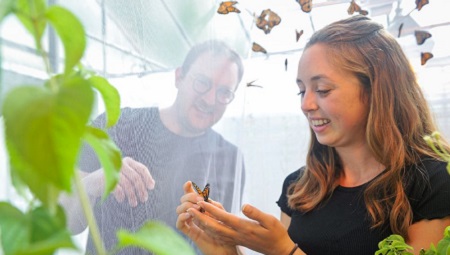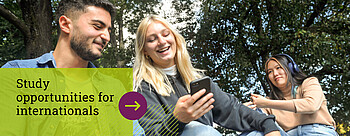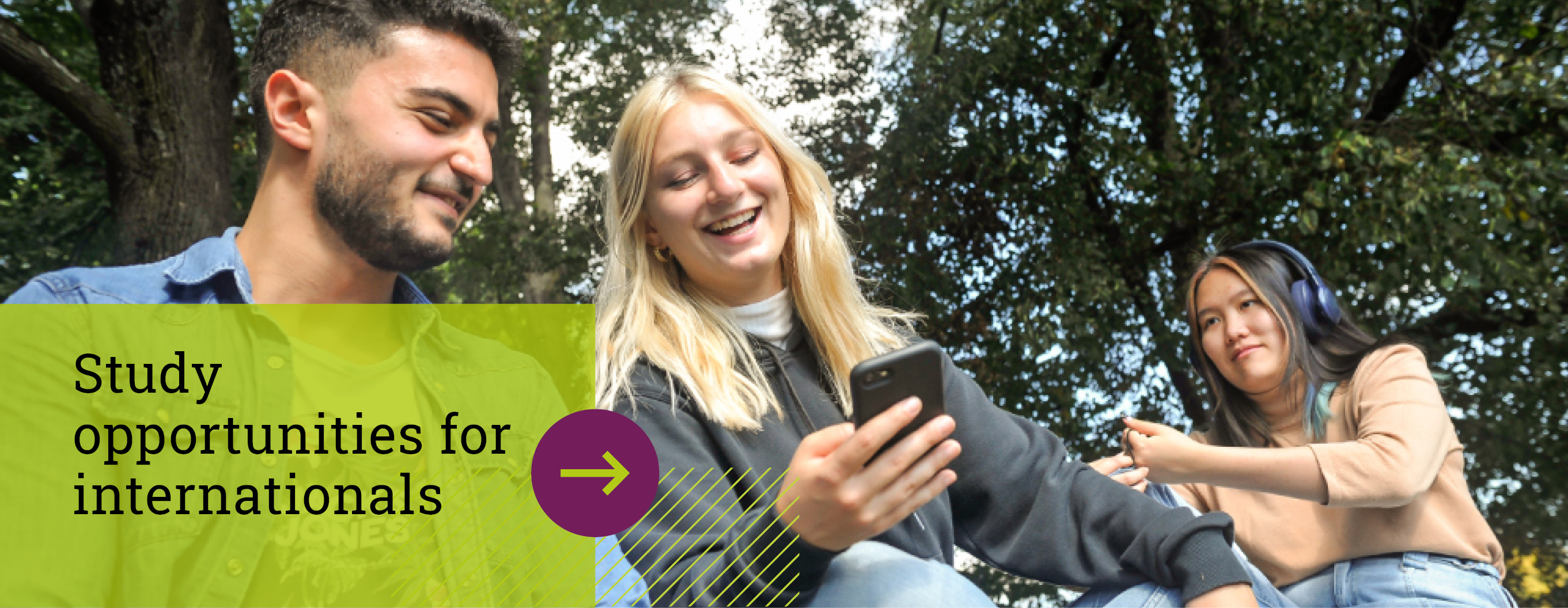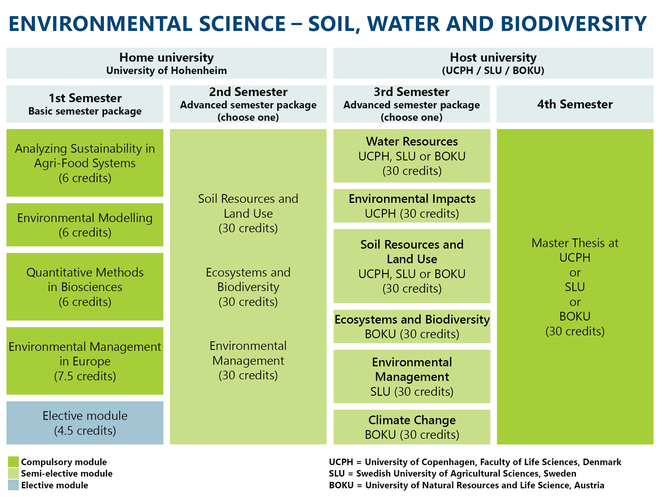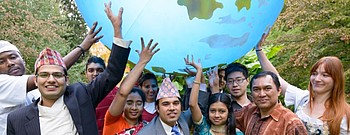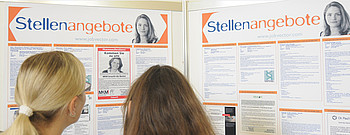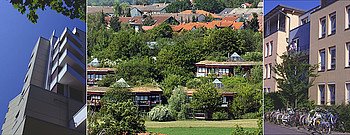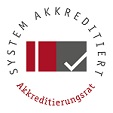Environmental Science - Soil, Water and Biodiversity Master
European Double Master’s Program in Environmental Sciences
Environmental Science
Soil, Water and Biodiversity Master
European Double Master’s Program in Environmental Sciences
This degree program focuses on the sustainable use and management of natural resources in Europe. It allows you to deepen your knowledge in six different specializations: Water Resources, Environmental Impacts, Soil Resources and Land Use, Ecosystems and Biodiversity, Environmental Management, and Climate Change.
You will study at two of the four member universities of the Euroleague for Life Sciences and receive a full Master's degree from both. The partner universities in Sweden, Denmark, Germany, and Austria are Europe’s best in the area of environmental sciences.
What you can expect:
- Full double degree from two member universities of the Euroleague for Life Sciences
- Six different specialization options with a focus on soil, water, and biodiversity
- Ideal pathway for an international career in the environmental sector
- Reasons to choose Hohenheim
| Degree Master of Science |
4 semesters 120 credits |
Language English |
University places unlimited |
Location Stuttgart |
|||||
You will learn the principles used in the environmental management of ecosystems in Europe. Graduates of the degree programs are therefore able to identify problems in managing natural resources in an international context and to develop solutions for these problems.
The University of Hohenheim views international cooperation and exchange in the field of environmental management in Europe as a very important part of the program.
You can start yourfirst academic year
at one of the four participating partner universities:
- University of Copenhagen, Denmark
- Swedish University of Agricultural Sciences, Sweden
- University of Natural Resources and Life Sciences, Austria
- University of Hohenheim, Germany
You complete your first year of studies with a basic semester and an advanced semester at your chosen home university. During the first semester, you choose one of six specializations as well as the host university at which you will spend your second year of studies.In October and November of the first year, all students from the four participating universities take part in the mandatory Intro Days, which take place in hybrid form with on-site and online components at the respective home universities.In your second year of study, you will transfer to your host university. There you can continue the specialization of the first year or choose a new specialization. You will then complete your studies with your Master’s thesis, which is jointly supervised by lecturers from your home and host universities.After finishing your studies, you will receive a full Master’s degree from both universities at which you studied.You can find information on the individual modules in the module descriptions.
What you should bring with you
The formal requirements for the Master's program are:
- Bachelor’s degree in agricultural, environmental, or natural sciences or related subjects from a university in Germany or abroad, or from a university of applied sciences, with a standard period of study of at least 3 years (180 ECTS in total) (for “related subjects,” see Annex 2 of the Admission Regulations).
- Knowledge demonstrated in the transcript of records in at least two of the following three subject groups:
- Mathematics/Statistics (at least 6 ECTS credits)
- Biology/Ecology (at least 6 ECTS credits)
- Chemistry/Physics (at least 6 ECTS credits)
- If your final grade or grade point average for your degree is not above average, you will need to submit evidence of your particular aptitude for the program (for details see Admission Regulations § 4).
- Proven English language proficiency at TOEFL 92 (internet-based), IELTS academic 7.0 or Cambridge C1 Advanced level
You should have the following interests and knowledge in addition to the formal criteria:
- Team spirit and willingness to work in intercultural teams
- Willingness to transfer to another university in another country after the first academic year
This Master's program educates experts in environmental sciences and opens doors to many different career opportunities in companies and public institutions. Possible areas of work include:
- Environmental and quality management in companies and organizations
- Environmental technology companies
- Consulting firms for agriculture and environmental protection
- Impact assessment and risk analysis
- Research and development for international companies and organizations
- Research institutions
The Master’s program also qualifies students for a doctorate.
Janet Rotich (graduate of 2013, Kenya), Assistenz der Prüfleitung Eurofins
 “Envirofood is an up to date program that takes into consideration the current challenges affecting the world, from climate change to sustainable food production.
“Envirofood is an up to date program that takes into consideration the current challenges affecting the world, from climate change to sustainable food production.
The program prepares students to work in inter disciplinary fields in the areas of sustainable development, climate change, food production and quality assurance.
I would recommend EnviroFood to students looking for a multidisciplinary international course in the beautiful town of Stuttgart.”
Gisela Quaglia, (graduate of 2016), Argentinia, Marie Curie Early Stage Researcher, Flemish Institute of Technological Research, Belgium
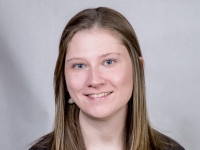 “EnviroFood's core modules increased my passion for applied environmental solutions and empowered me to look for ways to reduce agricultural impacts. Students learn to critically assess agricultural problems from different angles, i.e., the environmental, economic and social aspects.
“EnviroFood's core modules increased my passion for applied environmental solutions and empowered me to look for ways to reduce agricultural impacts. Students learn to critically assess agricultural problems from different angles, i.e., the environmental, economic and social aspects.
My desire to contribute positively to sustainable agriculture lead me to continue in a PhD program for which, EnviroFood gave me the tools required to start the next step in my professional career.”
Jamie Smidt, (graduate of 2014), USA, "Karlsruhe Institute of Technology (KIT), Institute of Meteorology and Climate Research, Ph.D. student
 “EnviroFood centers around a strong core curriculum of well-organized and interesting classes in agricultural and environmental sciences. In addition to compulsory classes, students can choose elective modules, customizing so the master’s program to their individual interests. The majority of my courses were highly relevant and thought provoking. My classmates and I are now working a variety of positions in diverse industries. EnviroFood prepared us well for careers both in and outside academia.”
“EnviroFood centers around a strong core curriculum of well-organized and interesting classes in agricultural and environmental sciences. In addition to compulsory classes, students can choose elective modules, customizing so the master’s program to their individual interests. The majority of my courses were highly relevant and thought provoking. My classmates and I are now working a variety of positions in diverse industries. EnviroFood prepared us well for careers both in and outside academia.”
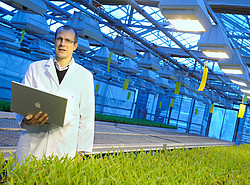
Good reasons to study at the Faculty of Agricultural Sciences in Hohenheim
First Place not Once but Three Times: The current Global Universities Ranking from U.S. News & World Report, the renowned NTU ranking, QS World University Ranking, and dathe Center of World University Ranking put University of Hohenheim’s agricultural research in 1st place in Germany.
In the agricultural university ranking from top agrar, the agricultural students at the University of Hohenheim give the grades 1.5 to 2.0. According to the ranking 2016, 88% of the students surveyed would recommend the University of Hohenheim for agricultural studies.
The University of Hohenheim puts great importance on quality teaching, which is demonstrated by several award-winning reform projects.
These projects include for example mobile teaching (German e-learning innovation and young scientists award (d-elina) in the category “Campus” at the BITKOM) or the ethics module, developed by the student group FRESH and awarded by the UN.
With long-term experience in carrying out large interdisciplinary projects on agricultural-ecological topics worldwide, Hohenheim offers ideal circumstances for students who want to gain hands-on experience as well as theoretical knowledge.

The vision of the Faculty of Agricultural Sciences is a global agricultural system which is productive, environmentally-friendly and socially-minded, and which is in harmony with society’s demand for a multi-purpose orientation.
Agricultural research at the University of Hohenheim is focused on four areas:
- Food for all: Security of global food supply
- Hazard prevention: Climate change and scarcity of resources
- Beyond fossil fuels: Bioenergy and bio-based value-creation networks
- Diversity instead of monoculture: Genome Diversity in Agriculture
There are no easy answers to these kinds of questions. That is why agricultural researchers at the University of Hohenheim work across disciplinary boundaries, collaborating with colleagues in the natural sciences, business administration and economics, and the social sciences, for instance in bioeconomics, a field of research and teaching that will become even more important in the future. That collaboration also has an impact on teaching.
Number 1 in internationalization: In the current EU ranking U-Multirank, the University of Hohenheim has a top spot in internationalization.
The basis for this placing is the decades-long, global commitment of the Agricultural Sciences. Especially our tropics research with 10 professorships has made the University known around the world.
International opportunities for students:
- 80 partner institutions worldwide (40 of which are in the Erasmus+ program)
- Member of the Euroleague for Life Sciences - the network for Europe’s best
- scholarship programs for travel, research, and exchange
- Worldwide alumni network
- Studies according to international standards for excellence and international competitiveness of graduates
Professors of the Faculty of Agricultural Sciences are in high demand.
The top experts include:
 | Chair of the scientific advisory council Prof. Dr. Martina Brockmeier The German Council of Science and Humanities is considered the highest-ranking advisory committee on topics of science in Germany. Its scientific members are appointed by the Federal President. |
 | In the Bioeconomy Council Prof. Dr. Regina Birner The Bioeconomy Council is an independent advisory committee for the German federal government. The goal: to establish a cross-sectoral and bio-based economy in Germany that uses as few fossil raw materials as possible. |
Further members in important commissions and expert lists
- Prof. Dr. Iris Lewandowski and Prof. Dr. Joachim Müller are members of the BMBF scientific advisory council "Agricultural Systems of the Future”
- Prof. Dr. Enno Bahrs is member of the BMEL scientific advisory council for biodiversity and genetic resources
- Expert lists on various agricultural topics

Scholarship and awards for studies, final theses, travel, and attending conferences: Thanks to many supporters, the University of Hohenheim has an unusually extensive scholarship culture.
Around 100,000 Euros is the total amount of all scholarships and awards that are presented each year at the Dies academicus.
More than 700 hectares of test area: Among German universities, the University of Hohenheim owns the largest amount of property. For students, this means a lot of room for their own experiments, research, and a great deal of hands-on experience.
Also directly on campus: State institutes for transferring science into practice, the Hohenheim Gardens, and the German Agricultural Museum.

The future lack of experts and managers in the area of agriculture / nutrition / horticulture means students of agricultural will have good career prospects. This was shown by a 2015 study by the Bundesverband Agrar Ernährung Umwelt (VDL).

The University of Hohenheim is a university with a long tradition. You will experience a truly unique university atmosphere enriched by the Baroque palace, the historic gardens and parks, and modern architecture: In 2009, the University of Hohenheim was declared the most beautiful campus university in the state.
In 2017, Hohenheim's President Stephan Dabbert was chosen by the German Association of University Professors and Lecturers (DHV) as the most popular president in Baden-Württemberg for the third year in a row. He was ranked second in all of Germany.
This jewel is located south of the state capital Stuttgart. Because it is close to Stuttgart, you have all the opportunities available in a big city. The University of Hohenheim is only a few minutes away from the airport, the Stuttgart Trade Fair Centre, and the autobahn and is easily reached with public transportation.
 | Unique party atmosphere: The historical Thomas-Müntzer-Scheuer, an old barn with a new purpose, is the party center of Hohenheim. |
 | The University ball in the pompous palace rooms is the social event of the year. |
You are required to spend the second academic year at your host university.
Experience environmental sciences in practice
You can best practice applying your environmental science knowledge during an internship. A suitable time for this is after the third semester, for example, before you start your Master's thesis.Gaining practical experienceYou can integrate an internship, e.g., in a national park, an NGO, or a government agency, into your degree program using the portfolio module as an elective module, or even use it to collect data for your Master's thesis. The program lecturers are happy to help you find these kinds of opportunities.Acquiring new competencesYou will find additional further education opportunities on campus in the form of the F.I.T continuing education courses, the “Artificial Intelligence and Data Science in Hohenheim” (AIDAHO) certificate, or the start-up support in the “Innovation Greenhouse”.Learning from practiceThe degree program offers you numerous opportunities for practical learning. Lectures by experts from outside the university, contact with alumni from your degree program, inspiring excursions, and applied examples in your studies give you a direct insight into professional practice and promote your ability to actively apply the knowledge you have learned. Strengthening language and intercultural skillsWould you like to improve your language skills? For this purpose, the Language Center at the University of Hohenheim offers various semester and intensive courses that you can take individually during your studies. You can even acquire the UniCert III C1 certificate as part of an elective module. During your studies, you will also acquire intercultural skills naturally by interacting with your fellow students from all over the world. Researching during your studiesDuring your studies, you will have the opportunity to participate in scientific working groups and gain valuable insights into research practice. By actively participating in research projects, student research projects, and specialized research modules, you become part of the scientific process and acquire qualifications for independent scientific work. You can find research topics at: agrar.uni-hohenheim.de/en/research0

All about Environmental Science - Soil, Water and Biodiversity
Semester fees, rent, costs of living - How much will studying cost you and how can you finance it? We have collected the most important information. more
If you choose to study in Hohenheim, you will have to look for a room or an apartment in the region. We can help you with this. more
Interesting and individual career prospects
This Master’s program trains you as an expert in environmental sciences and gives you access to a variety of career opportunities in companies and public institutions. Possible areas of work include:
- Environmental and quality management in companies and organizations
- Environmental technology companies
- Consultancy offices for agriculture, landscape planning, and environmental protection
- Impact assessment and risk analysis
- Research and development for international companies and organizations
- Research institutions
- Authorities and institutions at EU, national, regional, and local levels
It makes sense to complete internships (in Germany or abroad) within the Master's program. The lecturers in the program are happy to help you arrange internships. In addition, the Master's program qualifies students to embark on a doctoral project. Most universities as well as most graduate schools expect above-average performance in the Master's program for this.
| Application deadlines | |
|---|---|
| First subject-related semester | Only possible for the winter semester! 15 April (Germans, EU citizens, holders of a German university entrance qualification (Bildungsinländer)) 15 January (non-EU citizens) |
Higher subject-related semesters | Due to the double degree structure, it is not possible to apply for a higher subject-related semester. |
| Requirements | |
|---|---|
|
| Selection procedure | |
|---|---|
| Selection criteria | None, as the number of places is not restricted. |
| Due to the double degree structure, it is not possible to apply for a higher subject-related semester. | |
| Application process | |

